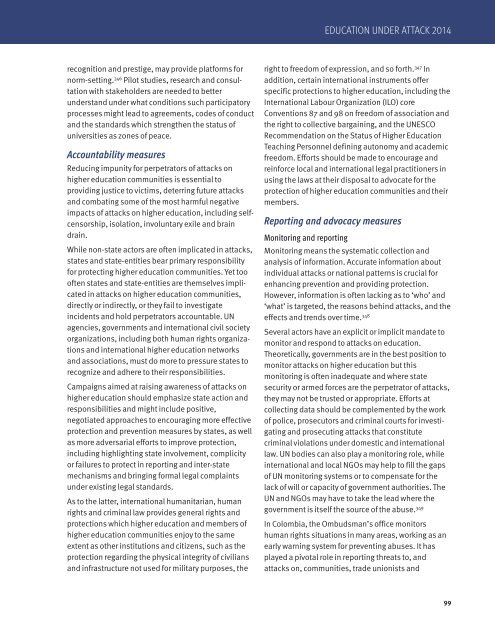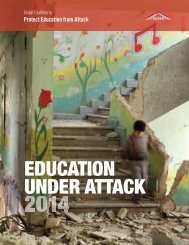Create successful ePaper yourself
Turn your PDF publications into a flip-book with our unique Google optimized e-Paper software.
EDUCATION UNDER ATTACK 2014<br />
recognition and prestige, may provide platforms for<br />
norm-setting. 346 Pilot studies, research and consultation<br />
with stakeholders are needed to better<br />
understand under what conditions such participatory<br />
processes might lead to agreements, codes of conduct<br />
and the standards which strengthen the status of<br />
universities as zones of peace.<br />
Accountability measures<br />
Reducing impunity for perpetrators of attacks on<br />
higher education communities is essential to<br />
providing justice to victims, deterring future attacks<br />
and combating some of the most harmful negative<br />
impacts of attacks on higher education, including selfcensorship,<br />
isolation, involuntary exile and brain<br />
drain.<br />
While non-state actors are often implicated in attacks,<br />
states and state-entities bear primary responsibility<br />
for protecting higher education communities. Yet too<br />
often states and state-entities are themselves implicated<br />
in attacks on higher education communities,<br />
directly or indirectly, or they fail to investigate<br />
incidents and hold perpetrators accountable. UN<br />
agencies, governments and international civil society<br />
organizations, including both human rights organizations<br />
and international higher education networks<br />
and associations, must do more to pressure states to<br />
recognize and adhere to their responsibilities.<br />
Campaigns aimed at raising awareness of attacks on<br />
higher education should emphasize state action and<br />
responsibilities and might include positive,<br />
negotiated approaches to encouraging more effective<br />
protection and prevention measures by states, as well<br />
as more adversarial efforts to improve protection,<br />
including highlighting state involvement, complicity<br />
or failures to protect in reporting and inter-state<br />
mechanisms and bringing formal legal complaints<br />
under existing legal standards.<br />
As to the latter, international humanitarian, human<br />
rights and criminal law provides general rights and<br />
protections which higher education and members of<br />
higher education communities enjoy to the same<br />
extent as other institutions and citizens, such as the<br />
protection regarding the physical integrity of civilians<br />
and infrastructure not used for military purposes, the<br />
right to freedom of expression, and so forth. 347 In<br />
addition, certain international instruments offer<br />
specific protections to higher education, including the<br />
International Labour Organization (ILO) core<br />
Conventions 87 and 98 on freedom of association and<br />
the right to collective bargaining, and the UNESCO<br />
Recommendation on the Status of Higher Education<br />
Teaching Personnel defining autonomy and academic<br />
freedom. Efforts should be made to encourage and<br />
reinforce local and international legal practitioners in<br />
using the laws at their disposal to advocate for the<br />
protection of higher education communities and their<br />
members.<br />
Reporting and advocacy measures<br />
Monitoring and reporting<br />
Monitoring means the systematic collection and<br />
analysis of information. Accurate information about<br />
individual attacks or national patterns is crucial for<br />
enhancing prevention and providing protection.<br />
However, information is often lacking as to ‘who’ and<br />
‘what’ is targeted, the reasons behind attacks, and the<br />
effects and trends over time. 348<br />
Several actors have an explicit or implicit mandate to<br />
monitor and respond to attacks on education.<br />
Theoretically, governments are in the best position to<br />
monitor attacks on higher education but this<br />
monitoring is often inadequate and where state<br />
security or armed forces are the perpetrator of attacks,<br />
they may not be trusted or appropriate. Efforts at<br />
collecting data should be complemented by the work<br />
of police, prosecutors and criminal courts for investigating<br />
and prosecuting attacks that constitute<br />
criminal violations under domestic and international<br />
law. UN bodies can also play a monitoring role, while<br />
international and local NGOs may help to fill the gaps<br />
of UN monitoring systems or to compensate for the<br />
lack of will or capacity of government authorities. The<br />
UN and NGOs may have to take the lead where the<br />
government is itself the source of the abuse. 349<br />
In Colombia, the Ombudsman’s office monitors<br />
human rights situations in many areas, working as an<br />
early warning system for preventing abuses. It has<br />
played a pivotal role in reporting threats to, and<br />
attacks on, communities, trade unionists and<br />
99



